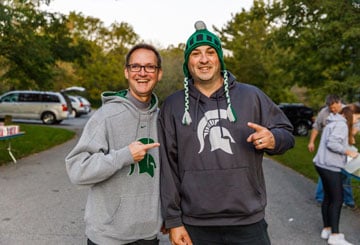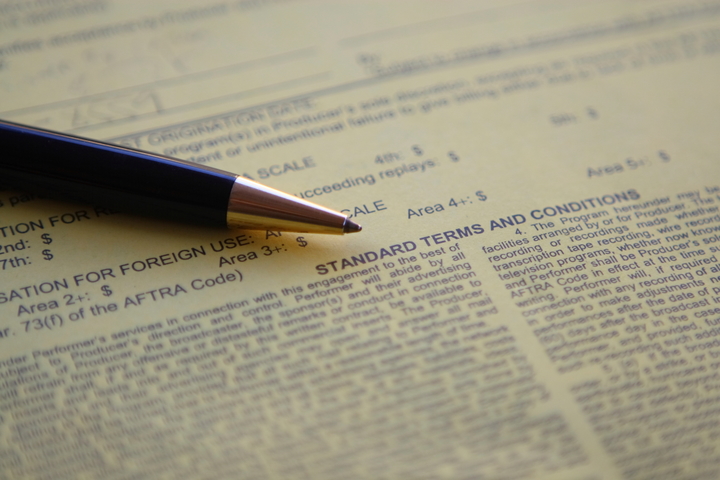- Code of Student Discipline
- Standing to assert violationsAny faculty, staff (including examination proctors), or student of the Law College has standing to assert a violation of this Code. Such assertion shall be made to the Dean of the Law College, who shall then proceed as set forth in Section V.
- Relationship Between this Code and the BarAny violation found to have occurred pursuant to this Code shall be reported to the appropriate State Board of Law Examiners, Character and Fitness Section, whenever admission to a State Bar is sought by a student found to have violated this Code.
- Relationship Between this Code and Law Student Rights and Responsibilities (LSRR)
As aspiring members of the legal profession generally, and of one or more state bar associations specifically, law students are subject to standards of conduct relating to their character and fitness to engage in the practice of law. The obligation to assess the character and fitness of law students is imposed upon the faculty and administration of the College of Law, and is not appropriately delegated in any manner to non-lawyers.
This Code provides the process and standards under which the College of Law will assess, discipline, and report matters going to the character and fitness of a law student to engage in the practice of law.
The LSRR describes the rights and responsibilities of law students in all matters not falling under the jurisdiction of the Code of Student Discipline. All matters arising within the jurisdiction of the LSRR are subject to the procedures described in the Academic Hearing Procedures for Michigan State University College of Law.
In appropriate cases, matters arising under the LSRR may be reported to a character and fitness committee (or equivalent) for a state bar if it is determined that those matters implicate the obligation of the College of Law to report matters relating to a law student's character and fitness to engage in the practice of law to a state bar to which the law student seeks admission.
The Assistant Dean for Student and Academic Affairs or the Associate Dean for Academic Affairs shall make an initial determination whether the matter raises issues going to character and fitness and must be decided under the procedures and standards of the Code of Student Discipline or whether the matter is not within the Code of Student Discipline and therefore must be decided under the procedures and standards of the LSRR and the Academic Hearing Procedures.
Any student whose matter is determined to be within the scope of the Code of Student Discipline may appeal that decision to the Dean. In the event the Dean determines that the matter is subject to the Code of Student Discipline, the student may appeal the Dean's determination that the matter is subject to the Code of Student Discipline to a faculty hearing board organized pursuant to Section VI of the Code of Student Discipline. - Jurisdiction.
- Violations potentially subject to discipline under this Code shall include:
- Any examination irregularity or any act of plagiarism in the submission of a written assignment. Such a finding may be based upon any probative evidence of, but not limited to, the following:
- Any conversation with another student during an examination, irrespective of the subject matter of that conversation.
- During an examination, the possession in the examination area of any prohibited material, irrespective of its use.
- During the examination, any perusal of another student's examination answer, irrespective of the use of such perusal.
- Disseminating any examination materials or information with another person who has not yet taken the examination.
- Use of another person's writings without proper attribution.
- Any act that is significantly disruptive of the functioning of the College or of any class.
- Any act respecting the College, its Trustees, faculty, staff or students which would constitute a felony or misdemeanor under Federal, Michigan, or local law;
- Any act of deceit, dishonesty, or misrepresentation of a degree that calls into question the perpetrator's character and fitness to engage in the practice of law;
- Any unauthorized intentional destruction or defacement of college property or property within the college;
- Any violation of the MSU Relationship Violence and Sexual Misconduct or Anti-Discrimination Policies, as determined by the appropriate MSU office.
- The assertion of a frivolous allegation of impropriety under this Code.
- Any examination irregularity or any act of plagiarism in the submission of a written assignment. Such a finding may be based upon any probative evidence of, but not limited to, the following:
- The foregoing shall not be deemed to limit the authority of the faculty and the administration to maintain order and professional decorum in the classroom and throughout the college. Professional decorum shall include avoidance at the college of the public use of epithets and slurs. This rule does not apply to nor prohibit the expression of ideas; an exchange of ideas is encouraged, not discouraged.
- The provisions of this Code also extend to conduct that occurs while an MSU College of Law student is enrolled at another institution of higher learning, whether as a visitor at another law school, as a candidate for a joint degree or pursuant to permission to take elective credits in a graduate department at MSU.
- Violations potentially subject to discipline under this Code shall include:
- Investigation and Determination of Probable CauseThe Dean, or the Dean's designee, shall have the responsibility for investigating allegations of impropriety. The Dean shall determine whether there is probable cause to believe that a violation has occurred and whether there is probable cause to believe the student against whom the allegation has been made is the violator.
If the Dean finds probable cause, he/she shall meet with the student and offer a proposed sanction, which, if accepted by the student, will result in no further proceedings under this Code. If no resolution is reached at this stage, then the procedures under this Code shall continue. - Hearing
- The student shall be presented with timely written notice of the allegations of impropriety and timely notice of a proposed meeting date for selection of the Hearing Panel.
- The Dean shall appoint a representative who shall present the case on behalf of the College.
- The student may appoint a representative to present the case on behalf of the student.
- The Hearing Panel shall be selected as follows: the pool for the Hearing Panel shall consist of the full-time faculty excluding any faculty member who is a complainant or a witness in the matter. Six names shall be drawn from the pool by blind draw. The student may then strike any three names from the six selected. The three remaining shall be the Hearing Panel. The Panel shall choose from among themselves a Chair who shall be responsible for the conduct of the Hearing including determination of questions of procedure and introduction of evidence.
- The Hearing shall be scheduled within a reasonable time. Extensions of time may be granted for good cause.
- Each side shall provide to the other a list of all witnesses it intends to call and a copy of all written evidence it intends to introduce.
- The student is entitled to be present during the testimony of witnesses.
- Both parties shall be afforded the opportunity to examine witnesses.
- The Hearing shall be recorded by means of electronic audio or audiovisual recording. This recording shall be retained and kept with the student's Law College record. Either side may have the proceedings stenographically recorded at his/her own expense.
- The strict rules of evidence shall not apply. The Chair should permit the introduction of any relevant evidence that is not inherently untrustworthy.
- The student is not required to testify at the Hearing.
- The College shall have the burden of proving, by a preponderance of the evidence, that a violation has occurred and that the student committed the violation.
- Argument and DecisionAfter submission of all of the evidence, the Dean's representative shall make a final argument, which shall address itself both to the substantive issues and to the question of the appropriate sanction should the Hearing Panel find that a violation has occurred. The student or student's representative will be given a like opportunity to argue to the Panel. The Dean's representative may make a second argument limited to matters of rebuttal. When the arguments are concluded, the Hearing panel shall deliberate in private and make written findings on the issues. If a finding is made that a violation by the student has been proven, the Panel shall impose an appropriate sanction. The findings and decision of the Hearing Panel shall be forwarded to the Dean and to the student. The decision of the Panel is final.
- Hearing Procedures for SanctionsWhere the appropriate MSU office has determined that a student has violated MSU's Relationship Violence and Sexual Misconduct Policy or it's Anti-Discrimination Policy, the student may seek a hearing under section f only as to the propriety of the sanction to be imposed by the Law College. A student contesting the adjudication on the underlying merits of the allegation must use the appeal process afforded by the appropriate MSU office.
- Recognition and Enforcement of MSU Student DisciplineAny disciplinary action taken by Michigan State University against an MSU College of Law student will be recognized and enforced by the Law College, to the extent that it is subject to this Code.
- Effect of WithdrawalIf a student withdraws during an investigation, the proceedings are terminated.
__________________________________________________________________
- Code Amendments: March 1994, February 2015, April 19, 2019.
- Spartan Life/MSU Student Handbook
MSU College of Law students are also expected to adhere to the MSU policies and procedures listed in the MSU Student Handbook and Resource Guide (Spartan Life).


